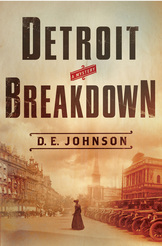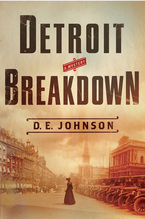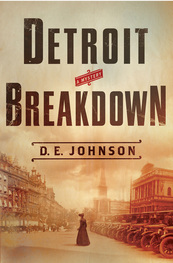 I could cite a great number of historicals here, because there truly are so many that are outstanding, but I’ll choose only two: Ironweed by William Kennedy, and The Road to Wellville by T.C. Boyle. You might find it interesting that neither of them are crime novels, given that that's what I write, but these are a couple of damn good books. Ironweed, which won a Pulitzer Prize in fiction, completes Kennedy’s “Albany Cycle,” a marvelous three-book series set in and around Albany, New York. The cycle starts with Legs, the story of 1920’s and ’30’s gangster Jack “Legs” Diamond, as told by attorney Marcus Gorman. The second, Billy Phelan’s Greatest Game, takes the titular character, a small-time and tarnished gambler during the Great Depression, through a harrowing kidnapping story. The cycle finishes only a few weeks after the end of book two, with Ironweed, the story of Billy Phelan’s father, Francis, who returns to Albany with Helen, his companion and fellow hobo. In his youth, Francis was a baseball player with major league potential and ambitions until he lost a finger in a fight. He fled Albany after dropping his thirteen-day-old son, Gerald, killing him. Decades later he returns to Albany to face the ghosts of his past, both literally and figuratively. Here’s how the book starts: “Riding up the winding road of Saint Agnes Cemetery in the back of the rattling old truck, Francis Phelan became aware that the dead, even more than the living, settled down in neighborhoods. The truck was suddenly surrounded by fields of monuments and cenotaphs of kindred design and striking size, all guarding the privileged dead. But the truck moved on and the limits of mere privilege became visible, for here now came the acres of truly prestigious death; illustrious men and women, captains of life without their diamonds, furs, carriages, and limousines, but buried in pomp and glory, vaulted in great tombs built like heavenly safe deposit boxes, or parts of the Acropolis. And ah yes, here too, inevitably, came the flowing masses, row upon row of them under simple headstones and simpler crosses. Here was the neighborhood of the Phelans.” Ironweed is a story of guilt and redemption, or such redemption as one can find in this life. It is at once violent and tender, hateful and loving. In my opinion, this is a masterpiece of American literature. My favorite book of all time. The Road to Wellville is a very different book. I hadn’t read any of Boyle’s previous novels when I came across it lying on a new fiction table at a local bookstore. The cover looked interesting, and the cover flap info showed it was set in Battle Creek, Michigan, which is only about 30 miles from where I live. I read a few random pages and decided I immediately needed to devour it. The Road to Wellville is one of those rare books that create grief about halfway through—a book so good and so much fun to read that I start to feel sad that I am going to finish it and will no longer be able to look forward to reading it every day. I come across those only every few years, and they all get reread. Boyle brilliantly skewers the health industry of the early Twentieth Century with the story of Will Lightbody, who is dragged to the Battle Creek “San” (sanitarium) by his grieving wife, who had recently miscarried their child. John Harvey Kellogg, the founder and head doctor of the San, leads the patients with his brand of healthfulness, much of which is on the mark, with a few notable exceptions like radium treatment. Kellogg was a real man and was very influential at the time. He created the breakfast cereal industry and could certainly be described as a force of nature, which Boyle brings to the fore in this book. Here’s how it starts: “Dr. John Harvey Kellogg, inventor of the corn flake and peanut butter, not to mention caramel-cereal coffee, Bromose, Nuttolene and some seventy-five other gastrically correct foods, paused to level his gaze on the heavyset woman in the front row. He was having difficulty believing what he'd just heard. As was the audience, judging from the gasp that arose after she'd raised her hand, stood shakily and demanded to know what was so sinful about a good porterhouse steak--it had done for the pioneers, hadn't it? And for her father and his father before him? “The Doctor pushed reflectively at the crisp white frames of his spectacles. To all outward appearances he was a paradigm of concentration, a scientist formulating his response, but in fact he was desperately trying to summon her name--who was she, now? He knew her, didn't he? That nose, those eyes . . . he knew them all, knew them by name, a matter of pride . . . and then, in a snap, it came to him: Tindermarsh. Mrs. Violet. Complaint, obesity. Underlying cause, autointoxication. Tindermarsh. Of course. He couldn't help feeling a little self-congratulatory flush of pride--nearly a thousand patients and he could call up any one of them as plainly as if he had their charts spread out before him . . . . But enough of that—the audience was stirring, a monolithic force, one great naked psyche awaiting the hand to clothe it. Dr. Kellogg cleared his throat.” You want to know what he says, don’t you? Get the book!
0 Comments
I don't normally post reviews in my blog, but this review of Detroit Shuffle was so good I felt like I had to. This is from Book Browse, a subscriber-based book website, which has over 110,000 unique visitors per month. Here's what they said: "Detroit Shuffle is the very best kind of amateur detective novel - a complex weave of disparate but interrelated threads that advance then double back on each other in ways that would make a Flemish tapestry artist envious.
"Mostly-failed engineer Will Anderson has thwarted the murder of suffragist Elizabeth Hume, and is desperately searching for the man who attempted to kill her. On top of that lies the emotional drama of Will's mental disability. He has blackouts, the result of clinical radium treatments he endured during a previous case. This bit of background information, alone, enticed me to read D. E. Johnson's previous novels, although Detroit Shuffle can certainly be read on its own. "It's the fall of 1912 in a city Will refers to as "the Paris of the West": Detroit, Michigan - and with good reason. In 1912 Detroit was the epicenter of something that would truly open great, new vistas for the entire population of the Western Hemisphere - the automobile industry. Elizabeth, who is Will's girlfriend and leader of a large and influential suffragist group, is speaking before a crowd when Will spots a man staring at Elizabeth and brandishing a gun. In a blur of panic, Will draws his weapon and attempts to overtake the mysterious gunman, who narrowly escapes Will's grasp before disappearing into the melee. With no corroborating witnesses, Will is taken into custody as a suspected assassin. Of his own girlfriend! "No one takes the notion of Will's attempt to kill Elizabeth seriously. But more damning is the fact that everyone, Elizabeth included, believes the alleged gunman is a figment of Will's imagination; a residual affect of his previous hospitalization. Their doubt only serves to fortify the young man's resolve. He becomes so determined to prove the gunman's existence that he gets himself fired from his job as an engineer at his father's electric car company for missing too many days' work. In the meantime, Will becomes a target. "Shady characters are following him, pursuing every shred of evidence he collects, threatening his life. Here is where Johnson stirs the pot, or plot, as it were. Will's evidence begins to coalesce into a suspected conspiracy to fix the upcoming election that will determine the immediate fate of women's suffrage in Michigan. Johnson brings in one potential suspect after another as if each is just waiting in the wings for his or her cue. There is the head of the Michigan Liquor Association, an old high school classmate, private detective agents hired to protect Elizabeth, a former nemesis, plus the corrupt Detroit Police Department. Will barely knows which way to turn. Even his "allies", Detective Riordan and Elizabeth, remain doubtful of his reports, and their well-intentioned actions often only serve to thwart Will's efforts. "All of this is exquisitely laid out amid sumptuous descriptions of a time and a city so alive and vital as to leap off the page and embrace the reader in its grand exuberance. My only, albeit infinitesimal, complaint is that sometimes Johnson's story arc and wickedly sharp characterizations fall second place under the weight of these meticulously researched descriptions. But as I think about it, that may just be Johnson's secret to plot pacing. Because he is indeed a master at establishing a finely tuned tempo, holding a reader just breathless enough to keep turning page after page. "Yessir. With all its mystery, thrills, moral, ethical and emotional dilemmas - even Will has self-doubts after suffering a day-and-a-half long blackout - to say nothing of Johnson's literary chiaroscuro, this is about as good as it gets. I say, if you read only only one amateur detective novel this year, make it this one." Got my all-time favorite email this morning. My goal is to write books that are, to use a "word" I sometimes see in reviews, unputdownable.
Toward the end of my books, I try to keep ratcheting up the tension, not giving the reader a place to jump off, where they can assume the protagonist will be okay until the next day. It's a fine line to walk. A writer can't just throw in cliffhanger after cliffhanger, because it will wear the reader down. Mix in a few teases with the cliffhangers, though, and you just might keep the reader going all night. Here's the email: "A pox on you, DE Johnson! Another school night up until 1:30am -- had to finish Det Breakdown -- and missed the Y this morning. If the Mr. mentions something about fat and lazy at least I can say I am well-read. OK, so now I am destitute. When will there be another? I want them to get married and somehow have children." If my skin starts breaking out, I'll be worried. Otherwise I'll just enjoy the thought of another exhausted reader ... Library Journal will be publishing this in their Sept. 1 issue. I especially loved this line: "Johnson’s spooky third series entry (after Motor City Shakedown) ensures its place among hot new historicals."
But Will, foolish? Say it ain't so! Johnson, D.E. Detroit Breakdown: A Mystery. Minotaur: St. Martin’s. Sept. 2012. c.352p. ISBN 9781250006622. $25.99. M "Someone has taken the plot of Gaston Leroux’s Phantom of the Opera to heart and is terrorizing the denizens of Detroit’s Eloise Insane Asylum. Unexplained deaths are not being reported to the police, and no one believes the protesting patients. Elizabeth Hume is frantic to get her hospitalized cousin, Robert, out before any harm comes to him. So Will Anderson foolishly institutionalizes himself so that he can work undercover, while Elizabeth comes on board as a hospital volunteer. They must find Robert and nab the killer before the murderer catches up with Will. VERDICT Johnson’s spooky third series entry (after Motor City Shakedown) ensures its place among hot new historicals. His unique take on Detroit in the early 20th century and its burgeoning automotive culture make this entry a perfect crossover selection for historical fiction buffs. The lead characters—chapters alternate between the two narrators—have a checkered and violent past that Johnson fills in nicely for new readers. Recommend for Stefanie Pintoff and Caleb Carr devotees."  In the September 1st edition of Booklist, they are going to run the following review of Detroit Breakdown (Yay!): "Building on his two previous titles set in the early 1900s (The Detroit Electric Scheme, 2010, and Motor City Shakedown, 2011), Johnson’s latest suspense novel finds maimed Will Anderson and his lover and former opiate addict, Elizabeth Hume, facing their personal nightmares as they track a strangler known as the Phantom. The trail leads to Eloise Hospital, an asylum for the insane, the tubercular, and the inconvenient, where Elizabeth’s cousin, Robert, is a patient. After Robert is falsely accused of the Phantom’s latest murder, Will and Elizabeth hatch an elaborate plan to infiltrate the asylum, nab the Phantom, and release Robert from the “Hole” (solitary confinement). While exposing his characters to sadistic doctors, violent orderlies, and chaotic, frightening madness, Johnson ratchets up the tension as the killer repeatedly eludes capture. The Phantom’s unmasking is such a shock that readers will wonder if Elizabeth and Will can ever recover. As suspenseful and twisted as Lehane’s Shutter Island (2003) and Lavalle’s The Devil in Silver (2012), this taut historical thriller is a definite winner."  Sweet article in the Detroit News, with their "Suspenseful Summer" reads. In addition to recommending new books by Gillian Flynn, James Lee Burke, Alexander McCall Smith, and others, they included Detroit Breakdown! (Read the rest of the article at the URL below.) Here's what they said: "Summer book lists usually proliferate when the lilacs are still in bloom, giving readers a chance to pile up books for the Fourth of July and early summer getaways. But for many of us, it's the dog days of summer when there is finally time to rack up some serious reading hours. . . . Right now, fans of the mystery/thriller genre have a bumper crop of new (and newer) books to consider. . . . "Readers who like Caleb Carr-style historical mysteries only have a few weeks to wait for Michigan author D.E. Johnson's ("The Detroit Electric Scheme) latest, "Detroit Breakdown: A Mystery" (Minotaur Books), out in September. Set in Detroit in 1912, the mystery involves a series of "opera ghost" murders (the Phantom of the Opera figures heavily) at the Eloise Hospital, Wayne County's insane asylum. One such murder involves the cousin of a young Detroiter, Elizabeth Hume, whose fiance, Will, has himself committed to Eloise in order to investigate. Will is already mixed up with some gangsters by the name of Bernstein, and other historic figures are in the mix — Edsel Ford makes a brief appearance, giving Will a reference." From The Detroit News: http://www.detroitnews.com/article/20120731/ENT05/207310305#ixzz22IhdxO3V  Great news today! Publishers Weekly has given Detroit Breakdown a starred review (defined as "Outstanding in its genre"). Here's the review: Detroit Breakdown D.E. Johnson. Minotaur, $25.99 (352p) ISBN 978-1-250-00662-2 "Set in 1912, Johnson’s excellent third mystery featuring auto mechanic Will Anderson (after 2011’s Motor City Shakedown) effectively employs parallel first-person narratives to advance an investigation into a creepy murder. Elizabeth Hume, an affluent woman with some skeletons in her closet, gets a late-night phone call that sends her and more-than-friend Will racing to Eloise Hospital, a sinister insane asylum in Wayne County, Mich. The anonymous caller has claimed that an inmate there, Robert Clarke, who’s a cousin of Elizabeth, has murdered a fellow patient and is threatening suicide. Elizabeth deftly defuses the situation when she arrives, but can’t persuade those in charge of Robert’s innocence. To clear his name, Elizabeth and Will both go undercover at the hospital—she as a volunteer, he as an amnesiac admitted for treatment. The authorities discount reports of other victims and that “the Opera Ghost” (aka “the Phantom”) was responsible. Johnson makes the most of the spooky setting. Agent: Alex Glass, Trident Media Group. (Sept.)" Booklist came out with their review of Motor City Shakedown and had some very nice things to say, including, "Violent, suspenseful, and complex, Johnson’s shakedown in Detroit sucks the breath out of readers rushing to the cliff’s edge with Will and Elizabeth. This gritty new series is a good match for James Ellroy and George Pelecanos fans..."
Pretty sweet getting compared to Ellroy and Pelecanos, two of the best writers of crime fiction! Less than four weeks to launch. I can't wait! Kirkus Reviews just passed along their take on Motor City Shakedown, and I'm pleased to say it was a positive one. Here it is:
MOTOR CITY SHAKEDOWN Author: Johnson, D.E. Review Issue Date: August 15, 2011 Online Publish Date: August 2, 2011 Publisher:Minotaur Books Pages: 288 Price ( Hardcover ): $24.99 Publication Date: September 13, 2011 ISBN ( Hardcover ): 978-0-312-64457-4 Category: Fiction Classification: Mystery "The Latin proverb 'Revenge is a confession of pain' perfectly describes Will Anderson's situation. In 1911 Detroit, Will Anderson lives for revenge. His involvement in the death of his friend Wesley McRae (The Detroit Electric Scheme, 2010) and his own disfigurement at the hands of mobsters has led him to follow the driver of crime boss Vito Adamo. When he finds the man with his throat cut, he knows he will be a suspect and realizes he must find the killer. It’s no easy job in a dangerous world populated by rival gangs willing to do anything to come out on top. Arrested for murder, Will spends months in jail before a confession from another man sets him free. But all is not well; he’s become addicted to morphine, and his family is imperiled. His father must either produce a large sum of money or let a union into his electric car company. His back against the wall, Will puts his hope in his ex-fiancée, Elizabeth Hume, recently returned from Europe; Detective Riordan, one of the few honest cops in Detroit; and the Purple Gang, a bunch of young boys he’s enlisted to help him survive the mob war raging around him. Under these circumstances, he finds that Vito Adamo may be more friend than enemy. Johnson’s period noir is violent and chaotic, but his clever weaving of history with intriguing characters makes for an exciting read." Violent? Me? Do you suppose they take exception to multiple shotgun murders? (In fact, I included only a portion of the real chaos and violence of Detroit's first mob war. Had I included it all, the book would have read more like a WWI book.) But, hey, two for two in reviews so far. I should be seeing Booklist and Library Journal soon. Hopefully they like Motor City Shakedown too! Got some great news today. Publishers Weekly came out with the first advance review for Motor City Shakedown - and liked it so much they gave it a starred review. Here it is (but don't read it if you haven't read The Detroit Electric Scheme yet. There's a serious spoiler here.)
Fiction review Motor City Shakedown D.E. Johnson. Minotaur, $24.99 (288p) ISBN 978-0312644574 "Set in Detroit in 1911, Johnson's vibrant follow-up to The Detroit Electric Scheme delivers razor-sharp depictions of the motor city. Will Anderson, a member of the family that owns the Anderson Electric Car Company (formerly the Anderson Carriage Company), is determined to bring to justice the killers of a close friend, Wesley McRae, who was murdered by thugs seven months earlier. Anderson, who's become a morphine addict after using the narcotic to dull the pain from the loss of some fingers on his right hand, gets a line on Carlo Moretti, the driver for one of the men behind McRae's death, mobster Vito Adamo. But before Anderson can confront Moretti, someone else slits the driver's throat, and Anderson himself becomes the prime suspect for Moretti's murder. Johnson brings the turbulence and rampant corruption of the era to life through his flawed yet tenacious lead in this worthy successor to his debut. (Sept.)" And then I got asked to be on a TV show next week while I'm up in Grand Rapids for the "GR Reads" Program. Next Monday night at 5:10 PM I'll be on "The One Seven" on Fox 17. It's a good day. |
AuthorD.E. Johnson: Archives
August 2016
Categories
All
|
 RSS Feed
RSS Feed